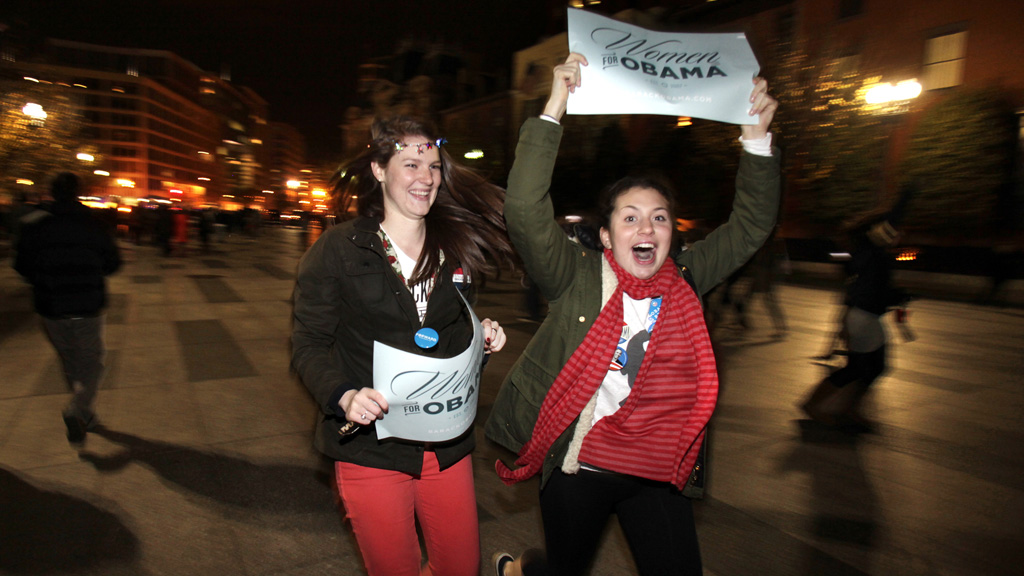How women put Obama back in the White House
 Cathy Newman
Presenter
Cathy Newman
Presenter
As presidential voting figures reveal the role of women in Barack Obama’s re-election and with a record number of female senators returned, Cathy Newman looks back on a momentous night for US women.

Well the “binders full of women” didn’t do Mitt Romney much good. In fact, the Republican candidate’s attempt to prove his feminist credentials ended up achieving quite the opposite. And this morning, it became apparent that women overwhelmingly opted to put Barack Obama back in the White House.
Others have pointed out the crucial role of Hispanic voters in Mr Obama’s second term victory. But as racial divisions have been exposed by the presidential race, it’s also abundantly clear that voters split according to gender and generation too.
A survey by the pollsters YouGov of 36,000 Americans in the final week of the campaign gave the incumbent president a 12 point lead amongst women, by 56 per cent to Mitt Romney’s 44 per cent. So how did that happen?
Suburban women used to be called Soccer Mom. And in every presidential election campaign they’re always sought-after voters. The difference this time, though, is Mr Obama could really go after their support in a way he couldn’t in 2008.
President Obama has stood up for women, moms and their families and in this election, we stood up for him, Kristin Rowe-Finkbeiner
Dianne Bystrom, director of the Carrie Chapman Catt Center for Women and Politics at Iowa State University told Forbes magazine: “He had to woo female voters in 2008 but had to be much more subtle so as not to put off Hillary Clinton supporters because he needed their vote.”
‘War on women’
What the Democrats did was to wage a very focused campaign for the women’s vote. Accusing Republicans of a “war on women”, Mr Obama singled out his opponent’s position on reproductive rights, access to health care and fair pay. And that enabled him to turn an eight point lead among women in 2008 into a 12 point lead on polling day.
As Kristin Rowe-Finkbeiner, the executive director and co-founder of MomsRising – a campaign group which describes itself rather endearingly as somewhere “moms and people who love them go to change our world” – explains: “Moms had a great deal at stake in this election and they voted in their interests. From making the Lilly Ledbetter Fair Pay Restoration Act the first bill he signed into law as president, to his historic achievement of implementing health care reform, President Obama has stood up for women, moms and their families and in this election, we stood up for him.”
And to be frank, way too many rightwingers looked slightly unhinged when it came to women. From radio talk-show host Rush Limbaugh’s bizarre rant against the law student Sandra Fluke for having the audacity to speak out on birth control to the now notorious remarks on rape and abortion by Republican candidates Todd Akin and Richard Mourdock, they clung on to a world-view many American women found deeply offensive.
‘Legitimate rape’
Mr Akin – who believes that in cases of “legitimate rape … the female body has ways to try to shut that whole thing down” and avoid pregnancy – and Mr Mourdock – who describes pregnancy resulting from rape as “something that God intended to happen” – sabotaged Republican chances of taking control of the Senate.
Read more: Akin row prompts heartfelt response from rape survivor
I couldn’t put it any better than Jason Whitman, the GOP chairman, who tweeted: “I just want to say a quick thank you to @ToddAkin for helping us lose the senate.”
So yes, this was a good result for a woman’s right to choose. Good too for gay women – Tammy Baldwin became the first openly gay senator – and Wisconsin’s first woman in the senate. Then Congress will also see the first Asian American woman in Mazie Hirono, and the first disabled woman in Tammy Duckworth. In fact, there will be a record number of female senators.
It’s tempting to spot an opportunity for the opposition this side of the pond. At the moment Britain is nowhere near as divided on gender lines. YouGov suggests a gender gap of a single percentage point between the main parties here, by contrast with a socking great 20 point gender gap in America.
But when you consider that we now have a health secretary who wants to slash the abortion limit, and a prime minister who looks likely to break his pledge on women ministers, that could change. Ed Miliband has an opportunity and David Cameron needs to take note.
This is a version of a blog which first appeared on www.telegraph.co.uk/women